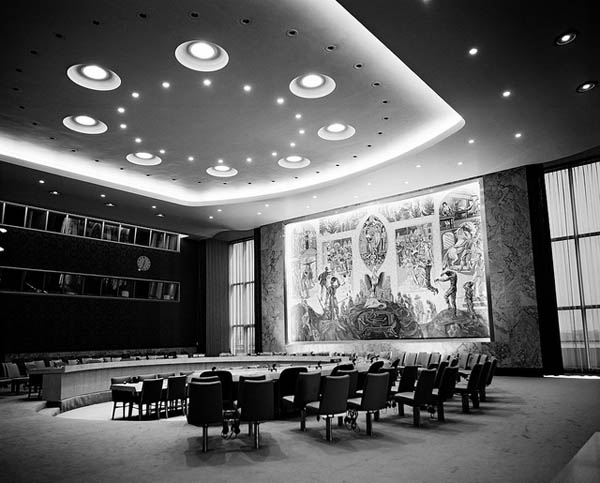Spain is back on the UN Security Council. The General Assembly’s 193 members recently elected the five non-permanent members for the period 2015-16 and, after three rounds of voting in the European group, Spain came ahead of Turkey. The outcome was in the air throughout the whole selection process, making it seem more like a race to host the Olympic Games or even a thriller. But the cinematic simile can also serve for a preliminary analysis from four different angles. We start with the most general shot, looking at the role of mid-range powers in the international system, then move on to two angles centred on Spanish foreign policy and end with a close look at the seamier side of domestic politics.
The long shot
Viewed from the broader perspective of the global influence wielded by mid-range powers (such as Spain and Turkey, although for different reasons) the Assembly’s decision can be interpreted as a confirmation that the acceptable interval for these countries to be part of the Security Council is about 10-12 years. It is perhaps admissible that Germany, Brazil, India or Japan should sit on the council more often. But that group of major powers, who are trying to break into the club of the five permanent members that designated themselves as such in 1945, does not include Turkey. For this reason Turkey’s hurried desire to shorten the wait and return to the council just six years after its last turn has been penalised, just as New Zealand’s prudence in admitting its status as a medium-to-low diplomatic power and thus wait 20 years to seek a seat has been rewarded. Of course, there is no criterion of fairness in these votes. But it is reasonable to think that States gauge very carefully the messages they wish to transmit, because to a certain extent they determine what the international community thinks of the weight of each of them. In that sense we cannot conclude so much that Madrid is more influential than Ankara, but rather that Spain has been more adept at measuring its strength.
Along with this explanation, which is probably the most important, there are three other factors that helped Spain and that correspond to a mid-strength European power: membership of the EU, influence in other regions and the absence of enemies. Indeed, it should be pointed out first that not once since the 1980s has the group made up of ‘Western Europe and others’ not elected a member state from the EU and this time Spain was the only one in the running. Secondly, it was critical to have the votes of Latin America and the Caribbean lined up (with the noteworthy exception of Brazil). This once again shows the importance of having a traditional influence in a region that is so vast and important. Finally, there is a factor that is something of a paradox bearing in mind that what was being chosen was one of the members that is going to lead world governance in terms of peace and security: Spain’s relatively low profile in foreign policy in recent years helped it win the seat, as opposed to the growing (and at times controversial) high-profile position of Turkey in the Middle East and Africa.
The medium shot
Focusing now on the voting result’s effect on Spain’s presence in the globalisation process, it is also possible to carry out a nuanced evaluation of Spain’s diplomatic success. This is the fifth time that Spain has been elected to sit on the UN Security Council and when this turn ends in 2016 it will have accrued a total of 10 years as a member of that body. It is a reasonable figure that more or less matches the country’s weight and objective international presence. In other words, Spain is in 14th place since the founding of the UN, or 11th since the 1980s. That is exactly the spot that Spain holds in the Elcano Global Presence Index. Of course, to the extent that the race for the council seat was hotly contested and by no way assured for Spain, it is perfectly reasonable for Spain to be satisfied in having managed to retain its level of influence and its role among the world’s middling nations, in a rank right behind those mentioned earlier (and alongside Canada, Italy, Argentina, Australia and perhaps Egypt, Pakistan and Turkey itself). But as this means that Spain is ranked just where it should be, its satisfaction should be measured and restrained.
Furthermore, it should be borne in mind that this indicator is in no way exact, as the workings of the voting system and historical circumstances have benefited certain countries (mainly in Latin America and Western Europe) and penalised others (Israel, South Korea, Indonesia, South Africa and Saudi Arabia are the clearest cases). So Spain is neither rising nor falling in its level of influence, but remaining in its rightful place in the UN system.
Close-up
Narrowing the focus a bit more and examining Spanish foreign policy from a more limited time-frame, it can be stated that Spain has indeed triumphed. It is a success for the country as a whole for, as the Foreign Ministry highlighted, the candidacy had been presented 10 years ago by the government of the party then in power, which was not the current one, while both the King and the opposition had taken part in the lobbying campaign. In any case, the success adds in an important way to the relatively positive overall showing of Spanish diplomacy which had operated in a tough economic environment, with less money for foreign development aid, peacekeeping missions and the fight against climate change and while Spain’s image as a major player in the international community had not yet been restored.
Early this year the Elcano Royal Institute itself said there was significant doubt as to whether Spain would be elected to the Security Council, and that its success or failure would be a good indicator of how Spain’s international relevance is perceived. Well, the goal has been achieved. And Spain has managed this at a delicate moment, so Foreign Minister José Manuel García-Margallo can feel reasonably satisfied with the results of a year that has yielded a slight improvement in Spain’s position in Europe, with the approval of the Foreign Action Law and the compiling of a new paper on Spanish foreign policy strategy. That said, given the announced strategic overhaul, it would be a good idea for Spanish diplomacy to move to consolidate the country’ status firmly and seize the moment to move from just sitting at the Security Council to actually making a difference. It is time to show that, just as Spain argued during its lobbying campaign, it will engage in global issues and use its seat to show it is committed to acting on major crises, the fight against the death penalty, the prevention of terrorism, promoting gender equality, encouraging dialogue between different cultures and promoting foreign aid. The true yardstick for this two-year period should be how Spain handles these issues and not simply the fact that it has a seat on the council.
The extreme close-up
Unfortunately, there is a fourth possible perspective from which to look at the issue: the extreme close-up, so close that we look no further than Spanish domestic politics in the most parochial sense of the word. In this short-sighted view Spain’s election to the Security Council is linked to the issue of independence for Catalonia, arguing that the 131 countries that voted for Spain were preserving its territorial integrity (were the 60 that voted for Turkey doing the opposite?). Another instance is the confrontational attitude that strives to downplay Spain’s achievement but that would have overstated the failure had that been the case. It is not necessary for public opinion to be able to determine precisely the place a country should have in the international multilateral system and to decide if the fact is more or less important (here we argue that it is, but deploring any display of unreasonable triumphalism). However, it is essential to enhance the quality of democratic debate in Spain. It is necessary to be more aware of the influential role that Spain and its people can play in a globalised world. And it is to be regretted when a healthy critical spirit is distorted into mere destructiveness, or when, conversely, a reasonable sense of satisfaction is transformed into a weapon for day-to-day political infighting.



